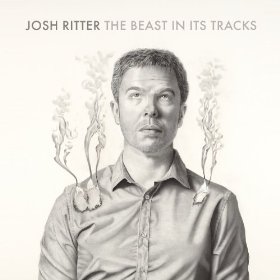New Lover – Josh Ritter
Of all the reasons to write a song, few make for better material than the broken heart. Some of the all-time great records have been the soundtracks to the darkest days of crumbling relationships and divorce.
On The Beast In Its Tracks, Josh Ritter gives us his own contribution to this genre. But, as you might expect from one of the finest storytellers in music, the result is anything but standard. While the breakup record traditionally dwells on the darkest period of soul-searching abjection, Ritter gives us something very different: this is a record about that strange period that follows loss.
When you are in the midst of such loss, it dominates your entire world. It seems impossible to do much of anything, because (as Elliott Smith once mused) everything reminds you of the person who is no longer around. It drains the color from your world. But, because we are incredibly resilient beasts, that moment eventually passes. It’s not quite dawn, because the pain is still quite fresh. But it no longer dominates your thoughts. You can go hours, even days, without thinking about it. And we discover that our life is still out there waiting to be lived. There are new people to meet, new loves to consider.
This is a record about that time. It’s characterized by a complicated welter of emotions, and Ritter does a wonderful job communicating the diversity of feelings. There’s wry reminiscence, a growing understanding that maybe you yourself bear some blame in what took place, a sadness that aches but doesn’t burn, and no small amount of tears. It’s an ocean of bitterness navigated by a few sturdy vessels of forgiveness.
And the genius of this record is that it’s just as much about new love as it is about loss. Ritter sings from the perspective of a man who has found someone new, who is beginning to see the endless new possibilities that promise to emerge on the new path he is walking. And yet: there’s a certain desperation in those words. It often sounds like someone doing everything he can to convince himself that he’s happy, that this new life is what he really wants, and that he’s over the pain. But the very fact that he needs to sing about his new love to his old love shows that he is far less removed than he would like to imagine.
There are new simple stories here; there is only the difficult work of rebuilding your world. And probably the biggest message here is simply that he needs to sing these songs, because the very performance is what will heal him. To offer forgiveness and kindness, not because you completely feel ready to do so, but simply because it’s the only way to eventually be able to forgive yourself.
You can hear all of this most clearly on “New Lover” in which Ritter insists on generosity: “I’ve got a new lover now, I hope you’ve got a lover too.” He acknowledges his own part in the mess, laments that he has spent so long being so angry, recognizes that he needs to simply look back on the good times and accept that they are now gone. And there is a tremendous amount of maturity in it. All of which makes the final lines ring so perfectly:
I hope you’ve got a lover now, hope you’ve got somebody who
Can give you what you need like I couldn’t seem to do
But if you’re sad and you are lonesome and you’ve got nobody true
I’d be lying if I said that didn’t make me happy too
It is a frank acknowledgement that recovery is a messy business, not something achieved in a single bound. And it provides the perfect mediating force to unite the album’s optimistic moments (“Joy to You Baby” is an incredibly generous and honest expression of love for the person who is gone) and its other tracks that express a muted but still seething anger. These sentiments do not contradict, he tells us. We can feel them both. And indeed, the forgiveness of “Joy to You Baby” is far more powerful because it comes from someone who is still full of hurt.

